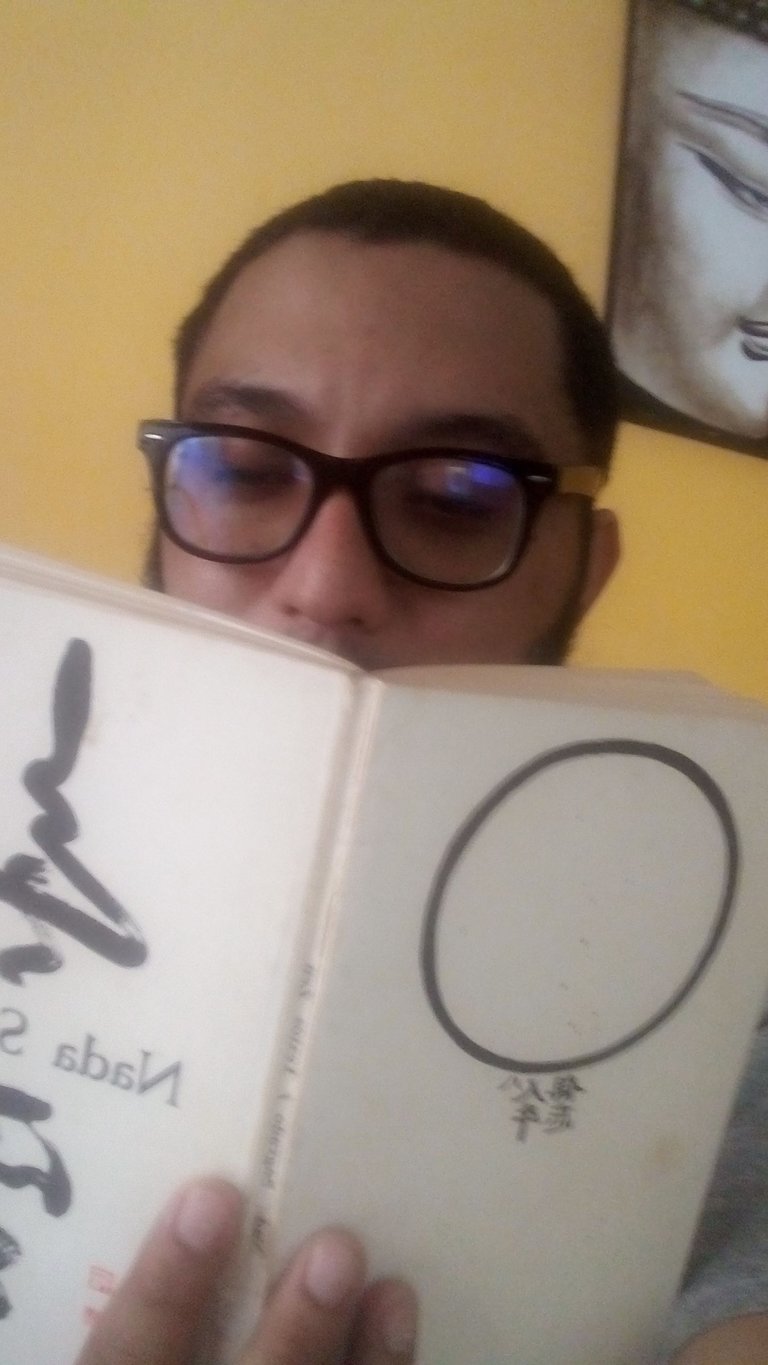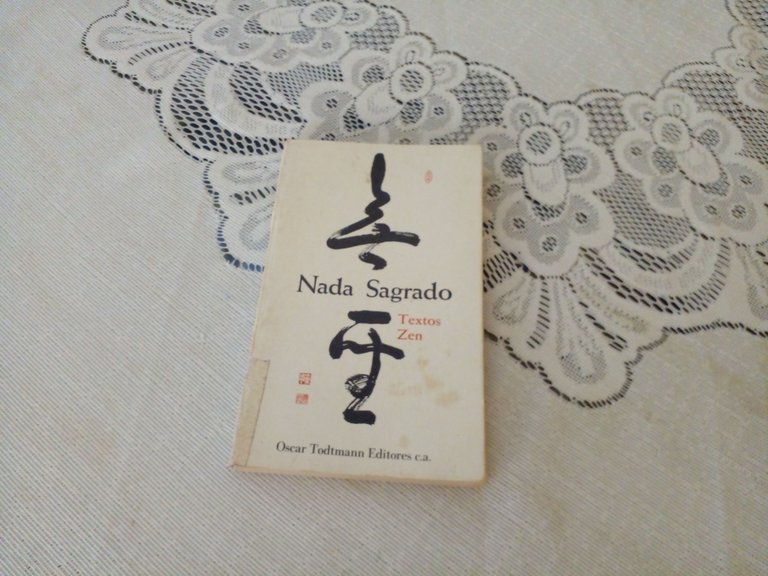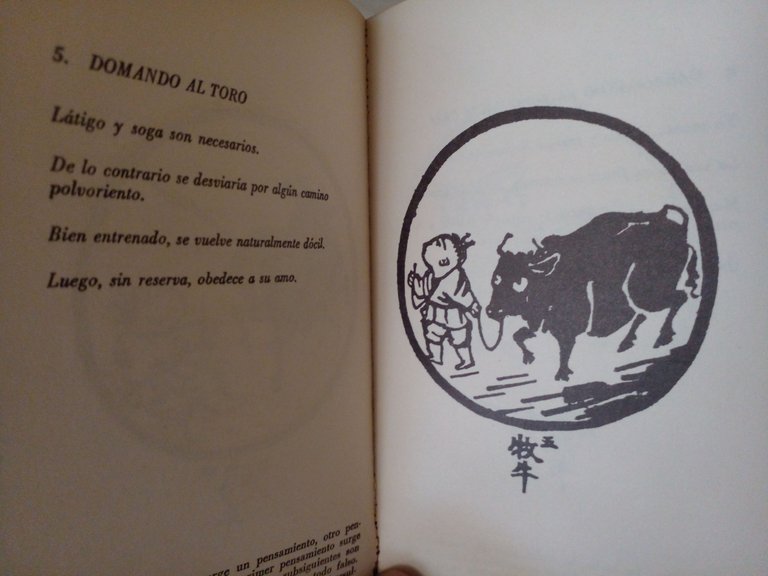Un Estoico leyendo un texto Zen [ESP-ENG] A Stoic reading a Zen text


Saludos amigos de Hive amantes de la lectura y los buenos libros. Hace unas semanas comencé a leer un libro que se llama "Nada Sagrado" y no es otra cosa que una obra compuesta por la selección de varios textos Zen.
**Greetings friends of Hive, lovers of reading and good books. A few weeks ago I started reading a book called "Nothing Sacred" and it is nothing more than a work composed of a selection of various Zen texts.
Este libro que no debe engañarnos por sus brevedad, con un poco más de 140 páginas posee un contenido lleno de sentido, no es de esos libros que deben ser leidos por diversión, sino que al aproximarse a sus paginas estaremos a merced de un detenemiento personal y espiritual si se puede decir así. Dividido en cuatro apartados:
1: Cuentos Zen
2: Los diez toros
3: El Maravilloso arte de una gata
4: ¿Qué es Zen?

This book, which should not deceive us by its brevity, with a little more than 140 pages, has a content full of meaning, it is not one of those books that should be read for fun, but when approaching its pages we will be at the mercy of a personal and spiritual detention, if we can say so. Divided into four sections:
1: Zen Tales
2: The Ten Bulls
3: The Wonderful Art of a Cat
4: What is Zen?
No haré un resumen del libro porque sería una tarea imposible, ¿Cómo condensar en un post la sabiduría de cientos de maestros Zen durante un lapso de cinco siglos?
Creo que para resumir el o definir el Budismo Zen debo citar textualmente una pequeña anectoda que aparece en la pagina 12 del libro y que introduce de algun modo si es esto posible, lo que este texto contiene:
El emperador le preguntó al maestro:
¿Cuál es el primer sentido de la sagrada Verdad?
Dharma contestó:
Lejos de eso, ¡Nada sagrado!
El Emperador le preguntó entonces:
¿Quién está frante a mí?
Dharma contestó:
"Yo no lo sé""
I will not summarize the book because it would be an impossible task, how to condense in one post the wisdom of hundreds of Zen masters over a span of five centuries?
I think that to summarize or define Zen Buddhism I must quote verbatim a small anectode that appears on page 12 of the book and that introduces in some way, if this is possible, what this text contains:
"The first Zen patriarch, Bodhidharma, brought in the 6th century the Zen teaching from India to China. The first chapter of the Zen book Bi-yan-tu relates the conversation between Bodhidharma and Emperor Wu-ti of the Liang dynasty. "
The emperor asked the master:
What is the first meaning of the sacred Truth?
Dharma replied:
Far from it, Nothing sacred!
The Emperor then asked him:
Who is in front of me?
Dharma replied:
"I do not know."
Este "Yo no lo sé" aunque parezca confuso, falto de todo y lleno de nada, posee una carga de sentido incecible. El yo no lo sé es edificante, porque abre un horizonte casí ilimitado hacia el saber, o mejor dicho, hacia el conocer, un buscar conocimientos para alcanzar la verdad inalcanzable, y esto es perfecto. Ahora bien, filosoficamente hablando no hay mejor actitud filosofica que no saber, saber que no se sabe. Solo así, el conocer es dinámico y vivido.
En este punto agoté lo que puedo decir sobre el texto, es un libro por descubrir. Pero esto no termina aquí, deseo comentarles como termine leyendo un texto Zen si no soy un experto en esta religión, como una versión del budismo tradicional que nació en la India hace más de 2500 años.
This "I don't know", although it may seem confused, lacking everything and full of nothing, possesses an incecible load of meaning. The "I don't know" is edifying, because it opens an almost unlimited horizon towards knowledge, or rather, towards knowing, a search for knowledge to reach the unattainable truth, and this is perfect. Now, philosophically speaking, there is no better philosophical attitude than not knowing, knowing that one does not know. Only in this way, knowing is dynamic and lived.
At this point I have exhausted what I can say about the text, it is a book to be discovered. But this does not end here, I want to tell you how I ended up reading a Zen text if I am not an expert in this religion, as a version of traditional Buddhism that was born in India more than 2500 years ago.

Hace meses tras haber visto un video en Youtube de un profesor hablando sobre el estoicismo, y que en determinado momento lo equiparaba al budismo sin el contenido religioso me dejó pensando y con mucha curiosidad al respecto, cosa que me llevo a investigar al budismo en relacón al estoicismo. Cronologicamente el budismo es anterior por un par de siglos al estoicismo, no sé si Zenón de Citio leyó u oyó sobre buda y su doctrina.
Este fenómeno de semejanza en prácticas y discrepancia en tanto que religión y secularidad me condujó a este texto que les he mencionado anterior mente y otros que les comentaré más adelante. También investigué al estocismo en relación al budismo y mi sorpresa fue algo alucinante.
Months ago after seeing a video on Youtube of a professor talking about stoicism, and that at a certain point he equated it to Buddhism without the religious content left me thinking and very curious about it, which led me to investigate Buddhism in relation to stoicism. Chronologically Buddhism is a couple of centuries before Stoicism, I do not know if Zenon of Citio read or heard about Buddha and his doctrine.
This phenomenon of similarity in practices and discrepancy in both religion and secularity led me to this text that I have mentioned above and others that I will comment on later. I also investigated Stoicism in relation to Buddhism and my surprise was somewhat mind-boggling.
Uno de los autores actuales que respeto y estimo, defensor y divulgador del estoicismo: Nicholas Nassim Taleb dijó alguna vez:
"Un estoico es un budista con actitud."
No con esto se pretende elevar al estoicismo sobre el budismo, sino, separar radicalmente la orientación no religiosa del estocismo en contraste con la relogiosidad y espiritualidad que caracteriza al budismo.
One of the current authors that I respect and esteem, defender and disseminator of stoicism: Nicholas Nassim Taleb once said:
"A stoic is a Buddhist with attitude."
This is not intended to elevate Stoicism over Buddhism, but rather, to radically separate the non-religious orientation of Stoicism in contrast to the praiseworthiness and spirituality that characterizes Buddhism.
Ahora hablemos un poco sobre el budismo, aunque debo confesar que tengo un poco de temor ya que no soy un experto y podría cometer un error por alguna mala interpretación o comprensión de lo que puede caracterizar al budismo. Comencemos con las 4 nobles verdades:
##-Dukkha o La realidad del sufrimiento.
##- Samudaya o La realidad del origen del sufrimiento.
##- Nirodha o La realidad de la cesación del sufrimiento.
##- Magga o La Realidad del Camino (hacia la Cese del Sufrimiento.)
Now let's talk a little about Buddhism, although I must confess that I am a little afraid since I am not an expert and could make a mistake by some misinterpretation or misunderstanding of what may characterize Buddhism. Let's start with the 4 noble truths:
##-Dukkha or The reality of suffering.
##- Samudaya or The reality of the origin of suffering.
##- Nirodha or The Reality of the Cessation of Suffering.
##- Magga or The Reality of the Path (towards the Cessation of Suffering.)
Un punto en común entre estas corrientes son que ambas intentan conseguir la tranquilidad del ánimo, el control de uno mismo, además tambien consideran a la ignorancia como una de las fuentes del sufrimiento. Creo que resulta verdaderamente difícil comentar todos los aspectos vitales del estoicismo y el budismo, pero asi como he mencionado las cuatro nobles verdades del budismo es justo mencionar las cuatro virtudes estoicas:
- Moderación
- Justicia
- Valor
- Sabiduría
A common point between these currents is that they both try to achieve tranquility of mind, control of oneself, and they also consider ignorance as one of the sources of suffering. I think it is really difficult to comment on all the vital aspects of Stoicism and Buddhism, but just as I have mentioned the four noble truths of Buddhism, it is only fair to mention the four Stoic virtues:
- Moderation
- Justice
- Courage
- Wisdom

En resumen, ambas sabidurías o estilos de vida versan sobre el cómo ser buenos, buscar la felicidad si es que existe algo como eso, prefiero pensarlo como la tranquilidad, tambien piensan en cuestiones como la plenitud y como debe ser a forma correcta de actuar.
Pero acá debo dejar algo en claro, el estoicismo no nos promete alcanzar la felicidad, sino que al contrario lo que busca es alejarnos del sufrimiento y en ese alejamiento se pretetende acercarse a la felicidad o lo que cada uno considere lo que es felicidad, en mi caso prefiero pensar en la tranquilidad.
Reflexiones como esta han nacido de estas lecturas. Aunque terminé hablando de mis reflexiones a partir del texto y no del texto en sí, ha sido porque no es un libro que como dije al principio pueda resumirse sino que es un libro que debe ser meditado e interiorizado.
In summary, both wisdoms or lifestyles are about how to be good, to seek happiness if there is such a thing, I prefer to think of it as tranquility, they also think of issues such as the fullness and how it should be the right way to act.
But here I must make something clear, stoicism does not promise us to reach happiness, but on the contrary what it seeks is to move away from suffering and in that distance it intends to approach happiness or what each one considers what is happiness, in my case I prefer to think of tranquility.
Reflections like this one were born from these readings. Although I ended up talking about my reflections based on the text and not the text itself, it was because it is not a book that, as I said at the beginning, can be summarized, but a book that must be meditated and interiorized.
Gracias por leer.
Thank you for reading.

Electronic-terrorism, voice to skull and neuro monitoring on Hive and Steem. You can ignore this, but your going to wish you didnt soon. This is happening whether you believe it or not. https://ecency.com/fyrstikken/@fairandbalanced/i-am-the-only-motherfucker-on-the-internet-pointing-to-a-direct-source-for-voice-to-skull-electronic-terrorism
https://twitter.com/FiloRiologo/status/1441898527404265476
The rewards earned on this comment will go directly to the person sharing the post on Twitter as long as they are registered with @poshtoken. Sign up at https://hiveposh.com.